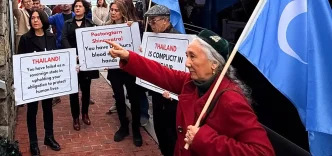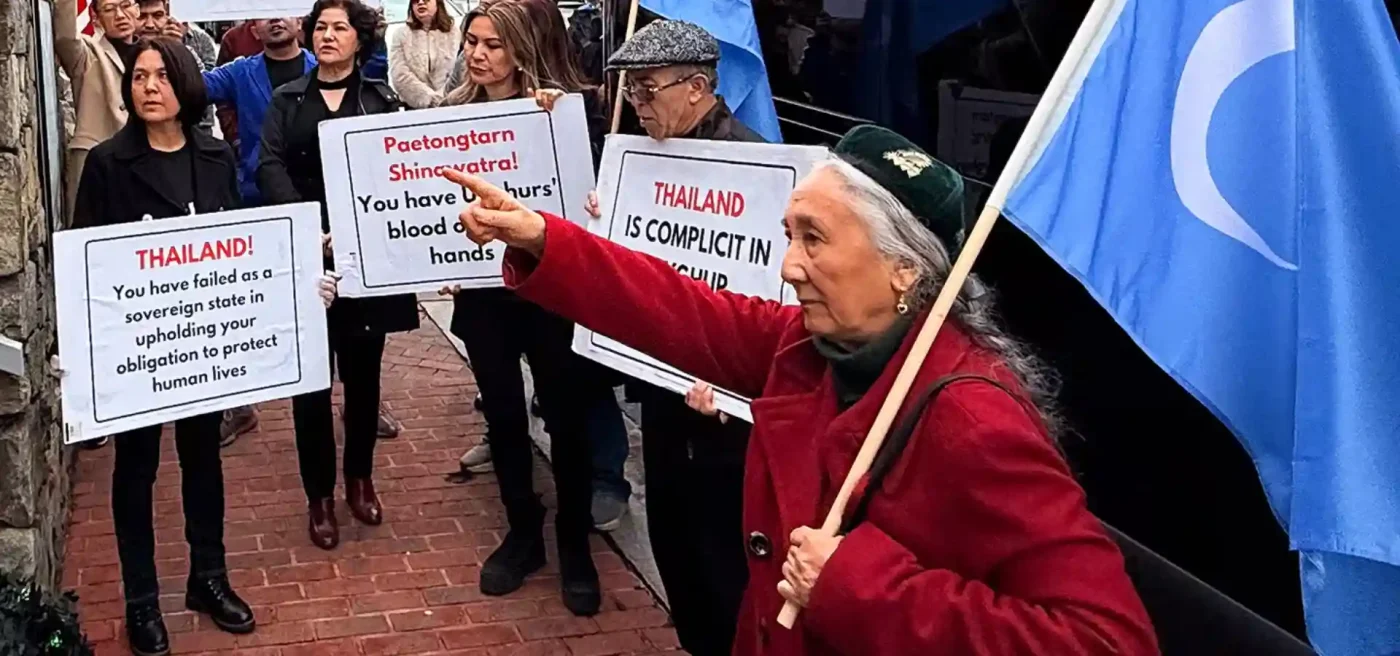Thailand is grappling with the fallout of US sanctions imposed after the deportation of at least 40 Uyghur individuals to China in late February, a move that has sparked international concern and complicated Bangkok’s efforts to negotiate favorable trade tariffs with Washington. The sanctions, which involve enhanced scrutiny for certain Thai nationals seeking US visas, have raised questions about the broader implications for Thailand’s foreign relations and economic ambitions.
Thai official Chayika addressed the issue on May 16, clarifying the nature of the US measures. “This is not a visa ban targeting specific individuals” she stated. “It involves a more rigorous review process for those listed, based on the purpose of their travel.” She emphasized that the United States has not disclosed the identities of those subject to the restrictions, and the measure does not impact individuals who already hold valid US visas. Chayika also noted that, to her knowledge, Foreign Minister Maris Sangiampongsa retains a valid visa to enter the United States.
Background of the Deportations
The deportation of the Uyghur individuals has been a flashpoint in Thailand’s international relations. The Uyghurs, a predominantly Muslim ethnic minority from China’s Xinjiang region, have faced widespread allegations of human rights abuses at the hands of the Chinese government, including mass detentions and forced labor—claims Beijing vehemently denies. Many Uyghurs fleeing China seek refuge in third countries, often hoping to reach Turkey, which shares cultural and linguistic ties with the group. Thailand, however, has faced pressure from China to return such individuals, leading to the controversial deportation earlier this year.
The decision drew sharp criticism from human rights organizations and Western governments, including the United States, which cited the move as a violation of international norms on refugee protection. The US response—imposing sanctions in the form of visa scrutiny—appears to be a targeted measure to signal disapproval without fully severing diplomatic or economic ties. Yet, for Thailand, the timing could not be worse, as the country is in the midst of delicate trade negotiations with Washington to secure lower tariffs for key exports like electronics and agricultural products.
Impact on US-Thailand Relations
Thailand has long been a key ally of the United States in Southeast Asia, hosting joint military exercises like Cobra Gold and serving as a strategic partner in countering China’s regional influence. However, Bangkok’s balancing act between Washington and Beijing has grown increasingly complex in recent years. Thailand’s economic ties with China have deepened through initiatives like the Belt and Road, while its security cooperation with the US remains a cornerstone of its foreign policy. The deportation of the Uyghurs, seen by some analysts as a concession to Chinese pressure, risks tilting perceptions of Thailand’s alignment.
The sanctions, while not as severe as a blanket visa ban or economic penalties, still carry symbolic weight. Enhanced visa scrutiny could affect Thai officials, business leaders, or other prominent figures, potentially limiting their ability to engage directly with US counterparts at a critical juncture. Although Chayika downplayed the immediate impact, noting that current visa holders are unaffected, the long-term implications of being on an undisclosed US watchlist remain unclear. If high-ranking officials or influential businesspeople face travel restrictions, it could hamper Thailand’s ability to advocate for its interests in Washington.
Economic Stakes in Trade Talks
Beyond the diplomatic sphere, the sanctions cast a shadow over Thailand’s economic priorities. The country is seeking to bolster its export-driven economy, which has faced headwinds from global supply chain disruptions and regional competition. Securing favorable tariff agreements with the United States could provide a much-needed boost to industries like automotive parts and processed foods, which employ thousands of Thai workers. However, the political friction caused by the deportations and subsequent sanctions may embolden US negotiators to take a harder line, linking human rights concerns to trade concessions.
Thai exporters are already feeling the pinch from existing tariffs, with some estimates suggesting that a reduction could save businesses millions annually. For instance, the cost of exporting certain goods to the US currently includes duties that add thousands of Thai Baht (hundreds of US dollars) per shipment. A trade deal could alleviate these burdens, but the sanctions introduce a new layer of uncertainty. As one Bangkok-based economist noted, “Thailand can’t afford to be seen as prioritizing geopolitical favors over human rights if it wants to maintain credibility with Western partners.”
Domestic and Regional Reactions
Within Thailand, the government’s handling of the Uyghur deportations has drawn mixed responses. Some segments of the public and political establishment view the decision as a pragmatic move to maintain strong ties with China, a major investor in Thai infrastructure and tourism. Others, including human rights advocates and opposition figures, argue that it undermines Thailand’s moral standing and exposes vulnerabilities in its refugee policies. Public demonstrations in Bangkok following the deportations highlighted the plight of the Uyghurs, with protesters calling for greater transparency and accountability from the government.
Regionally, Thailand’s actions have not gone unnoticed. Neighboring countries like Malaysia and Indonesia, which also host Uyghur refugees, face similar pressures from China to repatriate individuals. Thailand’s precedent could embolden Beijing to push harder in other capitals, potentially reshaping how Southeast Asian nations navigate the delicate issue of asylum seekers. At the same time, the US sanctions serve as a warning to other governments in the region that deference to China on such matters may come at the cost of Western goodwill.
Human Rights Implications
The core of the controversy lies in the human rights implications of Thailand’s deportation policy. International law, including the principle of non-refoulement, prohibits countries from returning individuals to places where they face a credible risk of persecution or harm. Critics argue that by deporting the Uyghurs to China, Thailand may have violated this principle, exposing the individuals to potential detention or worse. While the Thai government has defended its actions by asserting that the deportees were not formally recognized as refugees, this stance has done little to quell global outrage.
The United Nations and various non-governmental organizations have called for Thailand to reassess its approach to asylum seekers, particularly those from conflict zones or oppressed minorities. The US sanctions, though limited in scope, underscore the intersection of human rights and foreign policy, signaling that such decisions carry consequences beyond immediate bilateral relations with China. For Thailand, the challenge will be to balance its domestic security concerns and international obligations without alienating key partners on either side of the geopolitical divide.
Looking Ahead
As Thailand navigates the repercussions of the US sanctions, the path forward remains uncertain. The enhanced visa scrutiny may be a temporary measure, but it serves as a reminder of the broader tensions at play in US-Thailand relations. With trade talks ongoing, Bangkok will need to tread carefully to avoid further escalation, potentially by demonstrating a renewed commitment to human rights or by engaging in dialogue with Washington to address mutual concerns.
At the same time, the plight of the deported Uyghurs continues to resonate, both as a humanitarian issue and as a test of Thailand’s role on the global stage. How the government responds in the coming months—whether by revising its refugee policies or doubling down on its current stance—will likely shape its international reputation for years to come. For now, the intersection of trade, diplomacy, and human rights remains a tightrope that Thailand must walk with caution.
















